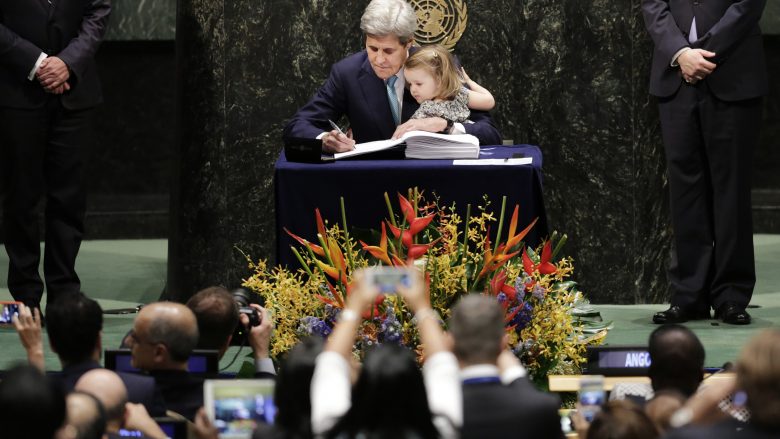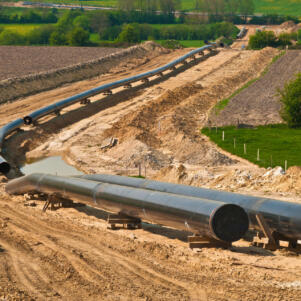Paris climate accord signed by 175 nations at UN
By Associated Press | April 22, 2016, 16:02 EDT
 U.S. Secretary of State John Kerry holds his granddaughter Isabel Dobbs-Higginson as he signs the Paris Agreement on climate change Friday at U.N. headquarters. (AP Photo/Mark Lennihan)
U.S. Secretary of State John Kerry holds his granddaughter Isabel Dobbs-Higginson as he signs the Paris Agreement on climate change Friday at U.N. headquarters. (AP Photo/Mark Lennihan) UNITED NATIONS (AP) — Leaders from at least 175 countries signed the Paris Agreement on climate change Friday as the landmark deal took a key step forward. But Republican presidential contender Ted Cruz criticized the accord as an attack on American families even as U.S. Secretary of State John Kerry predicted that the U.S. would formally adopt its requirements this year.
President Barack Obama praised the signings, saying he hopes the accord will allow “all of our children to inherit a cleaner, healthier, and safer planet.” The U.S. is the second-largest producer of carbon emissions, after China. Neither country has formally ratified the agreement.
Cruz, a U.S. Senator from Texas, denounced the Obama administration for focusing on the issue, saying the White House is “full of global warming alarmists.”
“Rather than turning attention and resources to real national security threats, such as radical Islamic terrorists who want to kill us, the Obama administration is instead focused on the SUV parked in your driveway,” Cruz said in a statement Friday.
Holding his young granddaughter, Kerry joined dozens of world leaders in signing the agreement, helping to set a record for international diplomacy: Never have so many countries signed an agreement on the first available day. States that didn’t sign Friday have a year to do so.
“We are in a race against time,” U.N. Secretary-General Ban Ki-moon told the gathering. “The era of consumption without consequences is over.”
Many now expect the climate agreement to enter into force long before the original deadline of 2020. Some say it could happen this year.
After signing, countries must formally approve the Paris Agreement through their domestic procedures. The U.N. says 15 countries, several of them small island states under threat from rising seas, were doing that Friday by depositing their instruments of ratification.
China announced it would “finalize domestic procedures” to ratify the Paris Agreement before the Group of 20 industrial nations holds a summit meeting in China in September. Ban immediately welcomed the pledge.
The world is watching the U.S. anxiously: Analysts say that if the agreement enters into force before Obama leaves office in January, it would be more complicated for his successor to withdraw from the deal because it would take four years to do so under the agreement’s rules.
Kerry put the deal into economic terms.
“The power of this agreement is what it is going to do to unleash the private sector,” he told the gathering, noting that this year is again shaping up to be the hottest year on record.
The agreement will enter into force once 55 countries representing at least 55 percent of global emissions have formally joined it. Maros Sefcovic, the energy chief for another top emitter, the 28-nation European Union, has said the EU wants to be in the “first wave” of ratifying countries.
French President Francois Hollande, the first to sign the agreement, said Friday he will ask parliament to ratify it by this summer. France’s environment minister is in charge of global climate negotiations.
“There is no turning back now,” Hollande told the gathering.
Canadian Prime Minister Justin Trudeau also announced that his country would ratify the agreement this year.
The climate ceremony brought together a wide range of states that on other issues might sharply disagree. North Korea’s foreign minister made a rare U.N. appearance to sign Friday, and Zimbabwe’s President Robert Mugabe brought applause when he declared, “Life itself is at stake in this combat. We have the power to win it.”
Countries that had not yet indicated they would sign the agreement Friday include some of the world’s largest oil producers, including Saudi Arabia, Iraq, Nigeria and Kazakhstan, the World Resources Institute said.
The Paris Agreement, the world’s response to hotter temperatures, rising seas and other impacts of climate change, was reached in December as a major breakthrough in U.N. climate negotiations, which for years were slowed by disputes between rich and poor countries over who should do what.
Under the agreement, countries set their own targets for reducing emissions of carbon dioxide and other greenhouse gases, with the shared goal of limiting global temperature rise to less than 2 degrees Celsius, or 3.6 degrees Fahrenheit. The targets are not legally binding, but countries must update them every five years. The deal also calls for rich nations to maintain a $100 billion annual funding pledge beyond 2020, Reuters reported.
As the Paris Agreement moves forward, there is some good news. Global energy emissions, the biggest source of man-made greenhouse gases, were flat last year even though the global economy grew, according to the International Energy Agency.
Still, fossil fuels are used much more widely than renewable sources like wind and solar power.
Friday was chosen for the signing ceremony because it is Earth Day.
Written by Edith M. Lederer and Cara Anna










